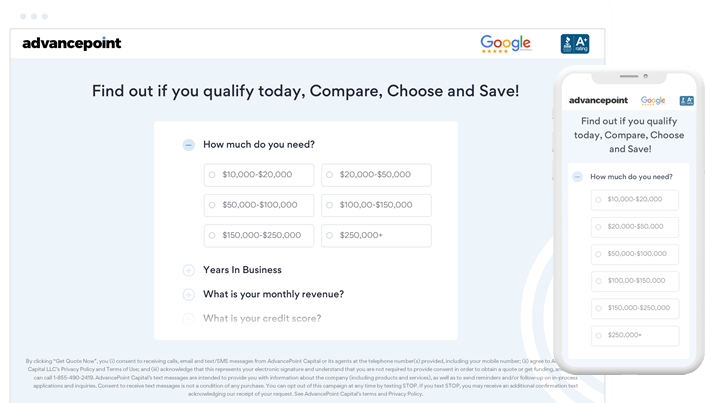
Finding lending options through traditional loans can be a difficult process. Your company must be profitable — with a strong revenue history, not to mention a great personal credit score as well to even be considered. However, this isn’t your only choice. There’s a wide variety of asset-based lending options that you can take advantage of today.
What is an Asset-Based Loan (ABL)?
Asset-based loans are business loans that are secured by collateral. An asset-based business loan is a type of financing secured by the borrower's business assets, such as inventory, accounts receivable, invoices, contracts/commitments, marketable securities, real estate, equipment, machinery, and other business assets. The loan amount is determined based on the value of these assets, and the borrower's ability to repay is evaluated in relation to the collateral provided.

Get Started Today
AdvancePoint Capital makes the loan application process a simple, straightforward experience.
How Does an Asset-Based Loan Work?
Asset-based loans (also known as ABL) are a form of business lending that relies on the collateral of your business, rather than just revenue and credit. Conventional business loans look at revenue, financials, and other indicators first, and collateral second, while asset-based loan programs look at collateral first and cash flow and financials second. A common misperception is that asset-based loans do not look at the credit, financials, and other matters of the business, which is NOT true. Asset-based lending leverages the assets of the business along with other qualifications to secure capital for the business and is a great alternative to more traditional business financing.
Types of Assets Explained
Accounts Receivable (A/R)
Accounts receivable (A/R) are invoices sent by businesses to customers for goods or services that have been delivered or completed but have not been paid for by the customer. Account receivables are also considered any amount of money owed by a customer to a business for products or services delivered even without an invoice. Proper accounting principles account for these outstanding invoices by listing them on a balance sheet and a running tally account receivable aging report. These accounts receivable listings can be used as collateral and are a great option for businesses that have outstanding invoices but no capital. Accounts receivable financing options can help your business make the most out of unpaid invoices.
Purchase Orders
A purchase order (also known as a PO) is an order/commitment to purchase products from a client.
Machinery and Equipment
Equipment refers to machinery, heavy equipment, or devices used for operating a business, typically in a professional, industrial, construction, or scientific environment.
Inventory
Inventory encompasses goods or materials on hand at the business for the use of production, sale, or distribution. Goods and materials can include raw materials, items under production, and finished products.
Marketable Securities
Marketable securities are securities or debts that are to be sold or redeemed within a year. These are financial instruments that can be easily converted to cash such as common stock, government bonds, mutual funds, or certificates of deposit.
Intellectual Property (IP)
Intellectual property refers to legal rights to inventions, such as patents, trademarks, copyrights, and trade secrets. Consider an intangible asset, that provides a strategic advantage in an industry.
Commercial and/or Personal Real Estate
Real estate is the property, land, buildings, air rights above the land, and underground rights below the land. Asset-based lending for real estate might require submitting your property documents with the application.

Most Common Uses of Asset-Based Loans
Asset-based loans can be used for various purposes including:
- Cash Flow
- Advertising/Marketing
- Raising capital to expand business
- Inventory or supplies
- Emergency Cash infusions such as emergency relief for accounts receivable issues
What Are the Best Industries for Asset-Based Loans?
- Transportation
- Manufacturing
- Staffing Agencies
- Technology
- Construction
- Wholesale B2B (Businesses to Business) Industries
What Documents May Be Needed to Get Approved for an Asset-Based Loan?
- Business Bank Statements
- Profit and Loss Statement
- Balance Sheet
- Account Receivable and Accounts Payable Aging Report
- Business Tax Returns
- Debt Schedule
- Inventory Report
*The required documents will depend on the type of assets that will be used as collateral
What Are Asset-Based Lending Rates?
Asset-based lending rates refer to the interest rates charged on lines of credit or term loans that are secured by specific assets, such as accounts receivable, purchase orders, inventory, marketable securities, equipment, or intellectual property. These rates vary based on factors such as the quality and value of the assets, the borrower's creditworthiness, financial statements, qualifications, and market conditions. Rates can be in the form of simple interest or factor rates depending on the business financing product and agreement.
Product Overview
- Rates: Interest rates start at 0% up to 28.99%
- Terms: 1 to 10 years
- Fees: Origination Fees vary typically 0% to 3%
- Payments: Low flexible monthly payments
- Credit Standards: Must have good credit and credit history
- Documentation: Full Documentation is required
Why Asset-Based Lending?
Most borrowers have difficulty navigating the traditional lending marketplace. When it’s all said and done, they need a lending option that works for them. Searching for asset-based home loans or commercial loans? An asset-based lender can be the best choice for your business, offering flexible and diverse options that you can fall back on when you need cash fast. Here are some of the benefits of asset-based lending and the most popular reasons why business owners choose asset-based lending.
Poor Credit or Revenue History
Asset-based lenders have one primary concern, and that’s the collateral you’ve provided. While most lenders will mull over your profitability, cash flow, and credit scores — an asset-based lender uses your collateral as security. So, those struggling with a less-than-stellar credit history or revenue can find an asset-based loan that works for them.
Speedy Growth
Growth is the most exciting part of owning or operating a business, but it’s also one of the most frightening. Young flourishing businesses need working capital to keep up — but they often don’t have the time in business or other qualifications to obtain a traditional financing solution. So, they turn to asset-based lending for a workaround that offers cash flow solutions to help with working capital and expansion. The good news is that if your issue is growth, you must be doing something right. An asset-based lender will build their relationship with you due to profitability projections and sales — along with what you’ve used as collateral.
Less Risk
Traditional business loans typically come with personal guarantees or collateral such as a family home. Asset-based lenders use fairly specific assets from your business’s balance sheet, so the personal risk to you is less. Most asset-based lending does not involve a personal guarantee for extra collateral, however, this depends entirely on the lender. When you need funding for working capital or other business needs — asset-based loans are an ideal option for those looking to mitigate personal risk while maximizing their possibilities.
Flexible Financing
Asset-based lending is a flexible solution for many businesses. An asset-based loan can work similarly to lines of credit, which makes them a great option for business owners struggling with working capital or other cash flow issues. Lines of credit allow business owners to only take out the cash they need when they need it most. For business lines of credit, you only pay interest on what you take out, rather than term loans where you repay in full with interest regardless if you use the full amount. Bank loans or other traditional funding options have many restrictions set out for the use of funds. However, asset-based lending is much more flexible. Asset-based lending allows you to use the funding for a wide variety of uses including working capital, expansion, purchasing another business, or refinancing an existing line of credit.
Get the Most Out of Your Valuable Assets
Many businesses have assets on the balance sheet that can prove to be extremely valuable to a particular lender. Equipment, machinery, inventory, and real estate are all assets that can be leveraged as collateral for working capital. Asset-based lending gives your company the power to grow using assets you’ve already invested in.
Asset-based lending offers a sound solution for many business owners that can’t find the funding option they need through traditional routes. These asset-based loans are flexible and are viable for a wide variety of uses — regardless of the loan amount. So, if you’re looking for a workable solution that resembles the flexible nature of a business line of credit, this could be the perfect solution that you’ve been looking for.
The fast, convenient, and straightforward way to get the money you need for your small business – now!
Get your quote today by filling out our simple form.



